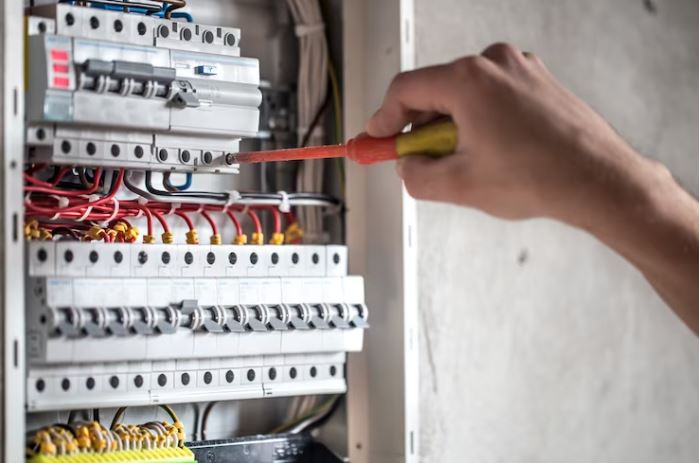How often does one consider the importance of regular electrical maintenance in maintaining a safe and efficient environment? The answer, quite surprisingly, may not be as frequent as it should be. This underlines the critical need for understanding the fundamental principles of electrical maintenance and its significance in preserving both residential and commercial properties.
By comprehending these basics, individuals become equipped with knowledge that can prevent potential hazards, extend equipment lifespan, and ultimately conserve resources.
Electrical maintenance transcends changing light bulbs or replacing fuses; it is an intricate process requiring technical expertise provided by professional electricians. These professionals play an instrumental role in ensuring that all electrical systems operate optimally.
Their contribution to conducting routine inspections, diagnosing faults, implementing repairs or replacements cannot be understated. For building owners and occupants alike, this insight highlights how essential regular electrical maintenance is in creating a secure and productive living or working space whilst fostering a sense of safety and belonging through well-maintained surroundings.
Understanding the Basics of Electrical Maintenance
Delving into the fundamentals of electrical maintenance reveals its critical role in ensuring the smooth operations of various systems, much like a well-oiled machine, thereby underlining its paramount importance in any functioning entity.
At its core, electrical maintenance involves regular inspection and correction of electrical equipment and systems to prevent malfunctions that could lead to system failures or safety hazards. This process often includes checking for loose connections, testing for proper operation, inspecting wiring for wear or damage, and cleaning essential components. By conducting these preventative measures regularly, potential issues are identified early before escalating into significant problems.
Understanding the different aspects involved in electrical maintenance is crucial to appreciate its implications fully. It encompasses a wide array of tasks from minor adjustments to complex repairs which require technical expertise and understanding. The frequency of these checks varies depending on the type and usage of the equipment; some may need daily check-ups while others only need periodic servicing. The variety of tasks performed during routine maintenance not only ensures operational efficiency but also contributes towards extending the lifespan of appliances and systems.
The importance of regular electrical maintenance cannot be overemphasized as it plays a vital role in maintaining safety standards within an establishment while guaranteeing efficient energy consumption. It mitigates risks associated with faulty wiring or malfunctioning equipment that can trigger fires or electrocution incidents – scenarios that underline the gravity attached to this practice beyond simple functionality considerations. Therefore, investing time and resources in preventive measures translates into significant savings down the line by minimizing costly repairs or replacements resulting from extensive damage due to neglect.
The Role of Professional Electricians in Electrical Maintenance
Undeniably, professional electricians play a pivotal role in ensuring the safety and efficiency of power systems through meticulous upkeep and repair. They possess the requisite skills and knowledge to identify, prevent, and address potential electrical problems that may compromise system performance or pose a safety risk.
Their expertise encompasses both preventive maintenance—routine inspections, testing, cleaning and adjustment of electrical components—as well as corrective maintenance aimed at rectifying any identified faults.
Professional electricians not only ensure optimal operation of electrical systems but also contribute significantly to prolonging their life span. They accomplish this by implementing regular maintenance schedules that align with manufacturers’ recommendations and comply with relevant regulations. This practice helps in forestalling premature wear-out of components, thus negating the need for frequent expensive replacements. Moreover, they adeptly use sophisticated diagnostic tools to pinpoint potential issues early on before they escalate into major problems that can disrupt normal operations.
The significance of these experts in electrician maintenance extends beyond immediate technical tasks. They are responsible for upholding high standards of safety in homes, workplaces and public spaces by mitigating hazards associated with faulty or ageing electrical infrastructure. Through their dedicated services, they help create safer environments where individuals can live, work or interact without fear of electrocution or fire outbreaks caused by malfunctioning electrical systems. Thus, their role is indispensable in preserving not just the integrity of physical structures but also the wellbeing of those occupying them.

